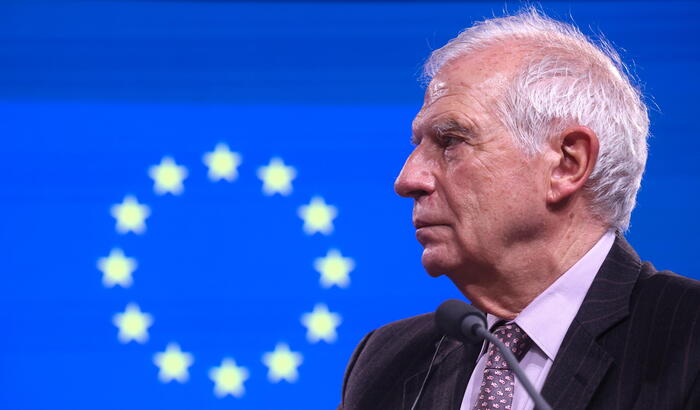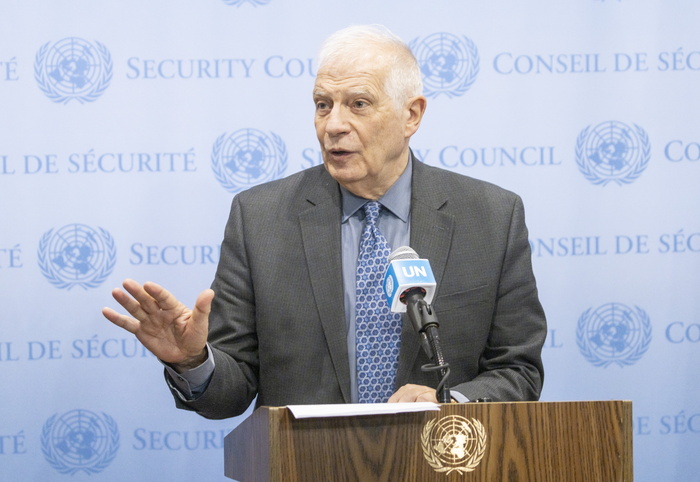Icon: enlarge
EU High Representative for Foreign Affairs and Security Policy Josep Borrell:
"push back, contain and engage"
Photo:
Kevin Faingnaert / DER SPIEGEL
Josep Borrell, 73, does the interview on the 12th floor of the Berlaymont building in Brussels. A satellite image of Europe, on which nary a cloud can be seen, hangs on the wall behind his desk here at the headquarters of the European Commission. But following the
mishaps
that accompanied his trip to Moscow in early February, the European Union's top diplomat has been under pressure.
DER SPIEGEL:
Mr. Borrell, a Spanish newspaper once attested to your "volcanic character."
But where was that volcanic character when Russian Foreign Minister Sergey Lavrov publicly embarrassed you in a recent press conference and Moscow expelled diplomats from three European countries afterward?
Borrell:
Actually, I am known for reacting immediately and not avoiding an argument.
But on this occasion, when I heard the comparison of the Navalny case with the Catalans, who were condemned for their role in the independence referendum, I considered going into a dialectical fight with him in front of the camera.
But I decided not to do so.
I didn't go to Moscow to talk about Catalonia.
I decided to stay calm.
DER SPIEGEL:
To many people you seemed more helpless than calm.
Borrell:
I don't think you would say that if you had witnessed our meeting behind closed doors.
I looked Lavrov in the eye there and told him very clearly what I thought about the human rights situation in Russia.
I called for the release of opposition politician Alexei Navalny and an independent investigation into the poison attack against him and criticized the arrest of the protesters.
Lavrov then warned me.
DER SPIEGEL:
What did he say?
Borrell:
He asked me if I wanted to talk about the Navalny case during the press conference as well.
Lavrov said that Russia wouldn't accept what they called an interference in internal matters.
DER SPIEGEL:
You are a Catalan, but you reject the region's independence from Spain.
Lavrov identified that as a weakness.
Borrell:
There's a Spanish expression that comes from the bullfighters who hold out the red cloth in front of the bull: "Run into the red."
It essentially means to fall for someone's line. I didn't want to do that. I don't see a press conference as a place for public disputes. The debate should take place behind closed doors. And there things were expressed in very clear terms.
DER SPIEGEL:
Lavrov also said that the EU isn't a reliable partner.
You should have fought back.
Borrell:
I did, too.
I told him that relations between the EU and Russia are at a low point, that we consider Russia to be an adversary, that we strongly condemn the poisoning of a Russian citizen and the way the judiciary is acting.
DER SPIEGEL:
So, from your point of view, you did everything right?
Borrell:
No.
When so many believe I should have shown a stronger reaction, I will not contradict them.
I probably should have indulged my desire to argue a little more in front of the cameras, too.
If this happens again in the future with Mr. Lavrov, I will have to go into the red cloth.
DER SPIEGEL:
The sanctions against Moscow imposed after the annexation of Crimea and the occupation of eastern Ukraine have had little effect.
What are the new sanctions agreed by the EU foreign ministers this week supposed to achieve?
Borrell:
This is the first time we are using the EU Human Rights Sanctions Regime.
We are using it to punish those responsible from the security apparatus and the judiciary who were involved in the conviction of Navalny and the suppression of the demonstrations.
These sanctions are of very high symbolic importance.
And the existing sanctions in relation to Ukraine are having an effect: They increase the political and economic costs for Russia for illegal actions taken against Ukraine.
Icon: enlarge
Josep Borrell during his interview with DER SPIEGEL at the European Commission's headquarters in Brussels.
Photo: Kevin Faingnaert / DER SPIEGEL
DER SPIEGEL:
Would it not be more effective to ban Russian oligarchs from entering the EU and freeze their foreign assets?
Borrell:
If the EU freezes assets, it has to be able to defend that in court.
Any oligarch could sue over that move in the EU.
We would then have to explain exactly what that person had to do with Navalny's poisoning or conviction.
If we as the EU are to uphold the rule of law, then the law must apply to everyone.
DER SPIEGEL:
The EU could have imposed much tougher sanctions against Russia in a legally secure manner.
Why didn't it?
Borrell:
Sanctions are just a tool, they don't replace policy.
We have to do many other things.
In the case of Russia, that policy must engage in three things: We have to push back, we have to contain and we have to engage.
DER SPIEGEL:
Contain Russia?
That sounds like Cold War vernacular.
Borrell:
I'm talking about targeted actions.
It's clear that we have to push back when Russia violates international law or human rights.
We have to contain or constrain Russia when it puts pressure on us through cyberattacks, through disinformation or by occupying the territories of sovereign states.
DER SPIEGEL:
One measure that would hurt Moscow would be the complete suspension of the Nord Stream 2 project that will allow Russia to sell natural gas to Germany through a direct pipeline.
You have said this is a decision for the German government to make.
But wouldn't greater political pressure on Berlin be appropriate here?
After all, a number of EU member states are strictly opposed to the project.
Borrell:
The European Commission, of which I am vice president, has said several times that Nord Stream 2 is not helpful in contributing to the diversification of energy supplies to Europe or the EU's energy autonomy.
But the Commission cannot prevent private firms from deciding to invest their money in an industrial project.
DER SPIEGEL:
The German government insists that Nord Stream 2 is a purely economic project and not a political one.
Are you persuaded by that argument?
Borrell:
Projects of this scale can never be purely economic.
There are geopolitical considerations, like it or not.
And geopolitics also played a role in the decisions on Nord Stream 2, that is quite evident.
DER SPIEGEL:
Your visit to Moscow also showed that Russia doesn't take the EU seriously as a foreign policy player.
Borrell:
It has always been Moscow's ambition to negotiate bilaterally with the member states of its choice and pass over the EU.
We absolutely must not allow that to happen.
When we pool our influence, we have a stronger bargaining position - not only with Russia.
Icon: enlarge
Russian President Vladimir Putin takes a dip in icey waters in January:
"There are geopolitical considerations."
Photo: Kremlin Pool / imago images
DER SPIEGEL:
Word of that doesn't seem to have gotten around in the EU yet.
Its members often disagree on foreign policy, yet all decisions in this area must be taken unanimously.
Borrell:
It would certainly be easier for me if we could eliminate the unanimity rule in foreign and security policy and take decisions by a qualified majority.
That would not only make a lot of things easier - debates would also suddenly be much livelier.
As long as everyone has a veto, you have less incentive to engage in a big discussion.
When in doubt, they can simply block things.
DER SPIEGEL:
Will the individual EU states ever be willing to give up their foreign policy veto rights?
Borrell:
I don't think it will happen during my term.
But in order to move from unanimity to a qualified majority, we need unanimity because this decision has to be taken with unanimity.
And there are many countries that value their veto power very much.
This means that I spend half my time on internal diplomacy within the EU.
DER SPIEGEL:
The European Union's global influence stems primarily from its power in trade matters and the appeal of its democratic model, so-called soft power.
Should military power also be added?
Borrell:
If we actually do have common security policy one day, we will also have a common defense capacity.
Perhaps we will even be a military alliance one day.
But for the time being, we are not.
DER SPIEGEL:
Why is that?
Borrell:
The European states combined spend almost three times more on defense than Russia.
But no one would dispute that Russia has much greater military might and that it is willing to use that power.
The EU member states are prepared to stand up for their interests, even militarily.
Just not under the European flag.
DER SPIEGEL:
Is that also due to the Germans, who are particularly reluctant when it comes to sending their soldiers on missions abroad?
Borrell:
Because of its history, Germany has certain inhibitions about entering into military operations abroad, and I understand that.
But there is a growing realization that we live in a dangerous world and that it is in the EU's interest to engage militarily - especially in challenges where NATO does not.
DER SPIEGEL:
For example?
Borrell:
Frankly speaking, I don't see NATO acting in the Sahel.
Nevertheless, someone has to do it.
Today, it is some members of the EU.
But I am convinced we could do this much more effectively if we Europeans pooled our military capacities.
DER SPIEGEL:
Do you think the EU's soft power has suffered as a result of the corona crisis?
A number of Asian countries have done a better job of keeping the virus under control, and countries like the United States and the United Kingdom are showing the EU how it is done in terms of vaccinating their citizens quickly.
Borrell:
I am convinced that it was the right decision by the EU member states to purchase vaccines jointly rather than compete for them.
DER SPIEGEL:
But in the US, people are being vaccinated at a much higher rate than here.
Borrell:
That's true, and in the UK as well.
That may be the initial price to pay for acting together.
Maybe a few countries would have gotten a little more vaccine if they had gone it alone.
But then others would have had to wait longer, and in the longer term, no one would have benefited.
DER SPIEGEL:
Let's ask this question in a more polemical way: Should people in Germany or France risk their health so that the vaccine gets to Malta or Estonia faster?
Borrell:
Let me put that question back to you polemically: Is the health of a German worth more than that of an Estonian?
The very essence of the EU is to respond to challenges in solidarity and to be stronger together.
And that's what happened with vaccine procurement.
Icon: The mirror




/cloudfront-eu-central-1.images.arcpublishing.com/prisa/U7WDRKWTDFDM7DWAUBJKCUSIHY.jpg)



